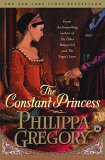Summary | Excerpt | Reading Guide | Reviews | Beyond the Book | Readalikes | Genres & Themes | Author Bio

Dressed in the gorgeous silks of their defeated enemy, turbaned,
slippered, glorious as caliphs, the Spanish royal family, glittering
with the spoils of Spain, took Granada. That afternoon Catalina, the
Princess of Wales, walked with her parents up the winding, steep path
through the shade of tall trees, to the most beautiful palace in Europe,
slept that night in the brilliantly tiled harem and woke to the sound of
rippling water in marble fountains, and thought herself a Moorish
princess born to luxury and beauty, as well as a Princess of England.
And this is my life, from this day of victory. I had been born as a
child of the camp, following the army from siege to battle, seeing
things that perhaps no child should see, facing adult fears every day. I
had marched past the bodies of dead soldiers rotting in the spring heat
because there was no time to bury them, I had ridden behind mules
whipped into staggering bloodstained corpses, pulling my father's guns
through the high passes of the Sierra. I saw my mother slap a man's face
for weeping with exhaustion. I heard children of my own age crying for
their parents burned at the stake for heresy; but at this moment, when
we dressed ourselves in embroidered silk and walked into the red fort of
Granada and through the gates to the white pearl that is the Alhambra
Palace, at this moment I became a princess for the first time.
I became a girl raised in the most beautiful palace in Christendom,
protected by an impregnable fort, blessed by God among all others. I
became a girl of immense, unshakable confidence in the God that had
brought us to victory, and in my destiny as His most favorite child and
my mother's most favorite daughter.
Alhambra proved to me, once and for all, that I was uniquely favored
by God, as my mother had been favored by God. I was his chosen child,
raised in the most beautiful palace in Christendom, and destined for the
highest things.
The Spanish family with their officers ahead and the royal guard
behind, glorious as sultans, entered the fort through the enormous
square tower known as the Justice Gate. As the shadow of the first arch
of the tower fell on Isabella's upturned face, the trumpeters played a
great shout of defiance, like Joshua before the walls of Jericho, as if
they would frighten away the lingering devils of the infidel. At once
there was an echo to the blast of sound, a shuddering sigh, from
everyone gathered inside the gateway, pressed back against the golden
walls, the women half veiled in their robes, the men standing tall and
proud and silent, watching, to see what the conquerors would do next.
Catalina looked above the sea of heads and saw the flowing shapes of
Arabic script engraved on the gleaming walls.
"What does that say?" she demanded of Madilla, her nursemaid.
Madilla squinted upwards. "I don't know," she said crossly. She
always denied her Moorish roots. She always tried to pretend that she
knew nothing of the Moors or their lives though she had been born and
bred a Moor herself and only converted -- according to Juana -- for
convenience.
"Tell us, or we'll pinch you," Juana offered sweetly.
The young woman scowled at the two sisters. "It says: 'May God allow
the justice of Islam to prevail within.' "
Catalina hesitated for a moment, hearing the proud ring of certainty,
a determination to match her own mother's voice.
Copyright © 2005 by Philippa Gregory Limited. Reproduced by permission of Simon & Schuster Publishing.
What really knocks me out is a book that, when you're all done reading, you wish the author that wrote it was a ...
Click Here to find out who said this, as well as discovering other famous literary quotes!
Your guide toexceptional books
BookBrowse seeks out and recommends the best in contemporary fiction and nonfiction—books that not only engage and entertain but also deepen our understanding of ourselves and the world around us.